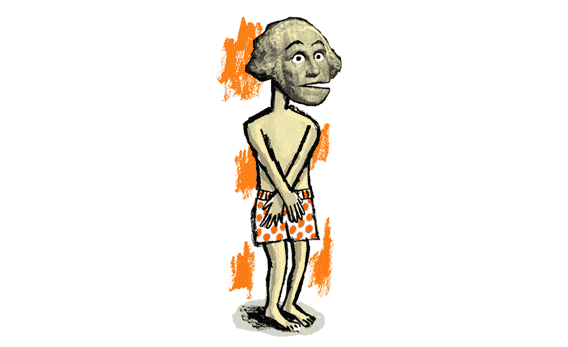Also in Slate, Farhad Manjoo imagines a world without cash.

Illustration by Robert Neubecker.
Back in 2001, on a visit to Tokyo, I witnessed an incident that shook my conceptual framework to its core. I saw a teenage girl use her cell phone to buy a can of soda from a vending machine.
I had not been aware this was within the realm of possibility. Granted: The transaction took about a minute and a half to complete—first a long delay as she loaded credit onto her DoCoMo handset, then 10 or 15 seconds of waving the phone in front of the machine before it balkily registered, and then another long wait as the machine processed the payment and at last ceded a beverage. She could have plunked a 100-yen coin into the change slot and saved a lot of hassle. But then she wouldn’t have been surfing the unstoppable wave of technological progress.
Cashlessness is coming. In many ways, it’s already here. Last summer I spent a few days in Iceland and never once touched the local currency—every single transaction I made was via credit card. Even in New York, I find it a bit irksome when I’m actually forced to visit an ATM and withdraw some greenbacks. It feels so antiquated. The situations requiring physical cash have dwindled to just a few irritating holdouts: hipster restaurants in Brooklyn that refuse cards; slightly sketchy house-painters who insist on cash payment, undoubtedly in the interest of tax evasion; car services that drive you to the airport and then apologetically tell you that they have no swipe reader.
Personally, I am eager for a future that is not all about the Benjamins. Cash is a drag. You constantly run out, and then need to find some grungy physical location that will dispense more of it. If you get mugged, it’s gone forever. Its sheer objectness can become a nuisance. (Small coins are forever collecting on my dresser, awaiting a purpose. And I once had to pay for an expensive Galapagos cruise entirely in Ecuadorian bills—after making repeated max ATM withdrawals, I needed to buy a cheap duffel bag just to lug the heap of money to the tour operator’s office.)
Over the next few weeks, Slate will explore what a cashless society might look like and what the repercussions of cashlessness might entail. Among the questions we’ll answer:
How much money could we save by eliminating cash? There’s the cost to the government of printing it. But there’s also the cost to private industry of collecting, processing, and hauling cash: Crinkled bills from cafeterias, coins from parking meters and vending machines—it’s easy to forget these need to be consolidated and moved around. Delivery trucks and security personnel rack up big energy and wage bills. The whole enterprise must be insured at a high level, since cash-collection trucks are frequent robbery targets.
Does cash encourage corruption? Its untraceable nature makes cash the favored, well, currency of criminal types. Politicians on the take. Illicit drug dealers. Street-corner prostitutes. Would a cashless society feature less crime? Conversely, would a world in which every transaction can be electronically tracked impinge on our privacy?
Who wins and who loses when we change the business of bills and coins? There is a faction right now that advocates the elimination of paper dollar bills in favor of dollar coins—coincidentally this faction includes the United Steelworkers and the International Association of Machinists. Others insist that dollar bills must not die—among them are both Massachusetts senators … and also the Massachusetts-based company that manufactures the paper used to print U.S. bills on. Meanwhile, tech startups like Square (which turns your smartphone into a credit card reader) and Uber (which lets you cashlessly order a car service from your phone) are anticipating and enabling the transition to a non-cash future.
Will this be the end of spontaneous charity? If you decide to give money to a homeless person on the sidewalk, how will you do it without cash? Subway buskers, church donation boxes, Salvation Army bell ringers, wishing wells—what becomes of these and others when there are no coins and bills?
If we give up cash dollars, do we give up any international edge? The United States derives benefits from the dollar’s dominant position in the global economy—from the very fact that U.S. currency is accepted by Vietnamese taxi drivers and hoarded by nervous Russian oligarchs. If our currency were entirely virtual, would we lose some of those advantages?
As for me, I’ll be living in a cashless here-and-now. For the duration of this project, I will handle no currency. Won’t spend it, won’t accept it, won’t touch it. I’ll set some obstacles for myself: How can I reward that excellent violinist on the D train platform? Can I (should I?) buy drugs with a personal check? Will the lobster roll food truck accept some form of barter? Is there any way, absent paper bills, to make it rain at a strip club? I’ll report back on what it’s like to cut cash from my life.
Please use the comment section to suggest some challenges for me. Or, if you like, some inventive solutions. You can also let us know if you have opinions, or burning questions, about the societal ramifications of the world going cashless—we’ll do our best to address them. We’re looking forward to exploring this issue from every possible angle, and we hope you’ll come along for the ride.